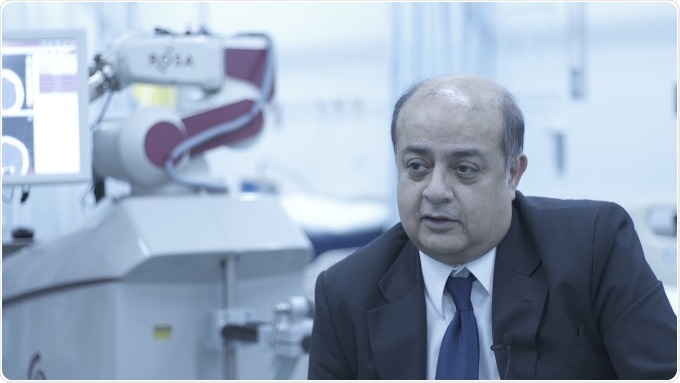SHEFFIELD Teaching Hospitals NHS Foundation has become the first NHS hospital in the UK to use a cutting-edge robot using a system similar to a GPS to transform the lives of patients needing complex brain surgery.

Mr Dev Bhattacharyya, consultant neurosurgeon at the Royal Hallamshire Hospital
Patients with poorly controlled epilepsy, deep-seated brain tumours, Parkinson’s Disease and other complex brain disorders are among those set to benefit.
Just like a GPS system, ROSA provides neurosurgeons with extraordinarily accurate 3D maps of the brain, allowing them to precisely and safely reach areas they could not reach before. The surgeon is then able to plan the best route for surgery, guiding the robot’s arm and instruments to the exact location of the seizure, tumour or biopsy. This increases accuracy, improves recovery times and surgical outcomes, and shortens the length of surgery.
The robot has been installed at the Royal Hallamshire Hospital’s neurological centre of excellence, and is being funded thanks to a £250,000 cash pledge from Sheffield charity Neurocare.
Mr Dev Bhattacharyya, consultant neurosurgeon at the Royal Hallamshire Hospital who received special robotic neurosurgery training in France and the United States, said:
We are moving increasingly towards minimally invasive medical interventions. Robotics, GPS-like systems and error correction algorithms allow us to perform more complex procedures with less risk.
Robotic surgery eliminates mechanistic errors and achieves sub-millimetre accuracy every time as well as taking a lot less time to perform the surgery. Previously UK patients would have had to travel privately to London or abroad to have robotic neurosurgery, so we are enormously grateful to Neurocare for bringing this first-class equipment to Sheffield and the NHS.
As a neurological centre of excellence, we pride ourselves on providing outstanding care to patients needing complex brain surgery, so this state-of-the-art robot helper will enable us to further develop our expertise and further improve surgical outcomes for patients.
ROSA’s pinpoint precision is far less invasive and has the potential to reduce surgery times by as much as 40 per cent, greatly improving recovery and surgical outcomes. The robotic arm mimics the movement of the human arm and can use instruments as thin as a needle.
Around 30 per cent of people with poorly controlled epilepsy could also benefit, as the robot helps surgeons to precisely detect where seizures originate.
By the end of the year it is hoped that the ROSA will also be used in Sheffield for complex spinal surgery, significantly reducing the risks and complications for patients with a range of degenerative spine diseases, trauma, deformities and spinal tumours.
Sheffield charity Neurocare worked with manufacturer Zimmer Biomet Robotics to bring the state-of-the-art health technology to Sheffield’s Royal Hallamshire Hospital.
Neurocare Chair Beverley Webster said:
We are excited and very proud to be able to bring the first ROSA Robot to an NHS hospital in the UK. Because of its reputation as a neurological centre of excellence, Sheffield has attracted highly specialised neurosurgeons who, using this amazing technology, can change the lives of many more people. We now hope companies, organisations and individuals will support us and them by donating what they can to the ROSA Appeal.